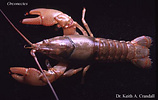Orconectes (Procericambarus)
Keith A. Crandall, James W. Fetzner, Jr., and Horton H. Hobbs, Jr..png?x=-921399464)


This tree diagram shows the relationships between several groups of organisms.
The root of the current tree connects the organisms featured in this tree to their containing group and the rest of the Tree of Life. The basal branching point in the tree represents the ancestor of the other groups in the tree. This ancestor diversified over time into several descendent subgroups, which are represented as internal nodes and terminal taxa to the right.

You can click on the root to travel down the Tree of Life all the way to the root of all Life, and you can click on the names of descendent subgroups to travel up the Tree of Life all the way to individual species.
For more information on ToL tree formatting, please see Interpreting the Tree or Classification. To learn more about phylogenetic trees, please visit our Phylogenetic Biology pages.
close boxIntroduction
The subgenus Procericambarus contains 25 described species distributed mainly in the Ozark Plateau, Ouachita Province, and Cumberland Plateau of the Eastern United States. These species represent a diversity in ecologies, inhabiting different areas within streams, as well as lakes and ponds. Furthermore, the subgenus represents a large diversity in morphologies from Orconectes macrus (the Neosho midget crayfish) with adult specimens ranging from 2.3 to 5.1 cm in length, to Orconectes longidigitus (the long-pincered crayfish) obtaining lengths of 20 cm or more. The distributional areas of many of these species are well known, due to the work of Williams (1954) and Pflieger (1987) . Variation in distributional areas range from extremely localized distributions, e.g., Orconectes saxatilis, which is known only from Pigeon Creek in LeFlore County, Oklahoma, to Orconectes rusticus, which is distributed throughout much of the range of the subgenus itself, including most of the Eastern United States.Discussion of Phylogenetic Relationships
The phylogenetic relationships presented here represent a similified summary of the phylogeny estimated by Crandall & Fitzpatrick (1996) based on 16S mitochondrial DNA sequences. The placement of O. durelli is based on the morphological description in Bouchard & Bouchard (1995). They suggest that this newly described species is most closely related to O. neglectus. While this phylogeny appears resolved in this figure, readers are refered to the discussions in Crandall & Fitzpatrick (1996) concerning the non-monophyly of certain species and the non-monophyly of this subgenus.References
Bouchard, R.W. and Bouchard, J.W. 1995. Two new species and subgenera (Cambarus and Orconectes) of crayfishes (Decapoda: Cambaridae) from the eastern United States. Notulae Naturae 471:1-21.
Crandall, K.A. and Fitzpatrick, J.F., Jr. 1996. Crayfish molecular systematics: Using a combination of procedures to estimate phylogeny. Systematic Biology 45:1-26.
Fitzpatrick, Joseph F., Jr. 1987. The Subgenera of the Crawfish Genus Orconectes (Decapoda: Cambaridae). Proceedings of the Biological Society of Washington, 100(1): 44-74, figures 1-18.
Hobbs, H.H., Jr. 1989. An illustrated checklist of the American Crayfishes (Decapoda: Astacidae, Cambaridae, and Parastacidae). Smithsonian Contributions to Zoology 480:1-236.
Pflieger, W.L. 1987. An introduction to the crayfishes of Missouri. Missouri Conservationist 48:17-31.
Williams, A.B. 1954. Speciation and distribution of the crayfishes of the Ozark Plateaus and Ouachita Provinces. The University of Kansas Science Bulletin 36:803-918.
Title Illustrations

Photo copyright © Keith A. Crandall
| Copyright |
© Keith A. Crandall

|
|---|
About This Page
Page constructed by Emily Browne.
Keith A. Crandall

Brigham Young University, Provo, Utah, USA
James W. Fetzner, Jr.

Carnegie Museum of Natural History, Pittsburgh, Pennsylvania, USA
Horton H. Hobbs, Jr.

Wittenberg University, Springfield, Ohio, USA
Correspondence regarding this page should be directed to Keith A. Crandall at
Page copyright © 2001
All Rights Reserved.
Citing this page:
Crandall, Keith A., James W. Fetzner, Jr., and Horton H. Hobbs, Jr. 2001. Orconectes (Procericambarus) . Version 01 January 2001 (under construction). http://tolweb.org/Orconectes_%28Procericambarus%29/7133/2001.01.01 in The Tree of Life Web Project, http://tolweb.org/







 Go to quick links
Go to quick search
Go to navigation for this section of the ToL site
Go to detailed links for the ToL site
Go to quick links
Go to quick search
Go to navigation for this section of the ToL site
Go to detailed links for the ToL site